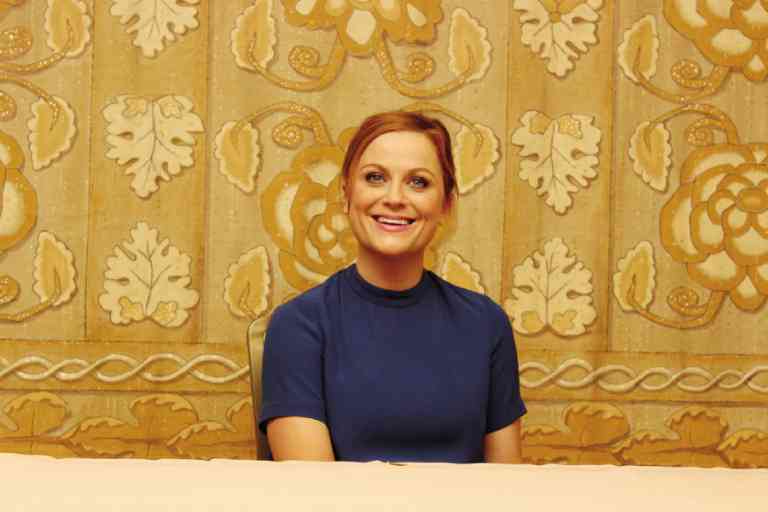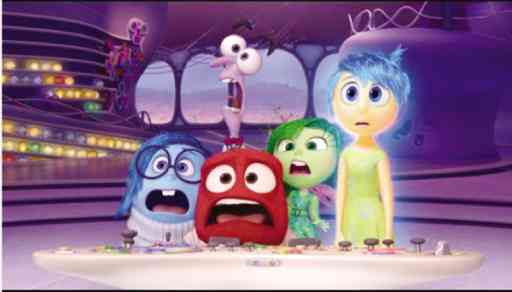Amy Poehler on costar Tina Fey: She is my chosen sister

AMY POEHLER says she is “excited about the next phase of producing, directing, writing, giving a voice to and supporting very funny people.” photo by RUBEN V. NEPALES
LOS ANGELES—More than two years later, Amy Poehler still treasures the moment when she sat on George Clooney’s lap at the 2013 Golden Globe Awards. We got to talk about the actress’ “core memories” when we recently interviewed her about Pixar’s “Inside Out.” She voices Joy, one of the five basic emotions in the “command center” of a young girl’s mind which also stores her memories.
Amy wonderfully voices the dominant emotion of Riley, an 11-year-old girl whose other emotions—Sadness (Phyllis Smith), Fear (Bill Hader), Anger (Lewis Black) and Disgust (Mindy Kaling)—go
on overdrive when she tries to adjust to her family’s sudden move from the Midwest to San Francisco.
Director Pete Docter and Filipino-American codirector Ronnie del Carmen brilliantly execute their concept of how Riley’s mind works. When Joy and Sadness are thrown into the far reaches of Riley’s mind, in a journey that takes them on a maze, from “Imaginationland” to “Dream Studios,” the directing pair offers imaginative, surreal visual surprises, including the hilarious boyfriend generator and the poignant sequence where once-glowing fond memory orbs fade into black nothingness like fading charcoal.
The Golden Globes is memorable to Amy, who cohosted the show with her pal Tina Fey, to audience and critical acclaim from 2013 to 2015. The “Saturday Night Live” (SNL) alum joked that winning a Golden Globe trophy in 2014 for her portrayal of Leslie Knope in “Parks and Recreation” was nothing compared to sitting on Clooney’s lap. The following are excerpts from our chat with Amy at the Montage Hotel in Beverly Hills:
Article continues after this advertisementIf you have to choose five core memories, which ones would they be?
Article continues after this advertisementI would say joining and creating a theater with the Upright Citizens Brigade; getting hired at SNL; getting to play Leslie Knope; sitting on George Clooney’s lap (laughs); and then talking to George Clooney after I sat on his lap (laughs).
Forget winning the Golden Globe, right?
Yeah (laughs). Winning is subjective. What is winning (laughs)?
If your own inner voices have their own film, what would it be called and what rating would it get?
It would be called “Polar Opposites.” It would be a smash at the box office. There would be five more emotions but maybe that’s just egotistical of me. It would be [rated] like a soft R. I don’t think we would be able to get away with a PG-13 [rating] because of my life.
What were you like when you were 11 years old and how different are you from that girl?
I feel almost the same in many ways. At 11, you have a pretty good sense of who you are. But my environment then was so different. I was a very young girl filled with a lot of anticipation and curiosity. I had a very loving home so fear wasn’t really in charge, which was nice.
Joy and sadness certainly battled it out every day. What I like about the film is that it’s set in that age in a young girl’s life, right before she gets distracted by the “noise” of the opposite sex—it’s just on the horizon. She’s living in her own world, being herself before she gets caught up in who she is supposed to be and what she is supposed to look like. At 11, I was all angles and elbows (laughs) and possibilities.
Who was your first crush?
Hmm, I don’t know who my first crush was. I do know there is a time in every young girl and boy’s life where suddenly, there’s a very dramatic shift when you turn from a person who is focusing on herself to a person who is focusing on someone else. It comes at a very different time for everyone. For some people, their boyfriend generators are activated very early and for others, it’s a slow moving process.
When are you the most joyful and angriest?
I am most joyful when I am around my family. I am often angry (laughs), but anger is a very useful emotion—it brings us justice and it’s how we figure out what is just in the world. Anger can protect us… It [helps] us set good boundaries and [we wouldn’t] be taken advantage of.
I am attracted to a healthy amount of anger because it often equates with a certain amount of self-worth and control. But I am just very good at not bringing it out when we have these interviews (laughs).
How much did your parents influence your humor?
They were big influences. I grew up in a blue-collar family with two teachers (parents). My parents were used to commanding a classroom and sometimes that took humor. There was a lot of gentle teasing in our family. I had to learn how to take a joke pretty fast. It’s what I associate with love in a good way.
I had to be a quick wit in my family. There’s a lot of memories of laughing. My mom was a big consumer of British comedy when I was growing up. There was the sound of “Monty Python,” SNL, “Carol Burnett” and all these shows were on because my mother was watching them. My soundtrack was what my parents were watching on TV.

THE COLORFUL characters in “Inside Out” are the five basic emotions in the “command center” of a young girl’s mind.
What can we look forward to about your “Sisters” movie with Tina Fey?
Tina and I play sisters whose parents decide to sell our childhood home. We have one last party [in the house]. We are a little too old for it and we try to pull it off.
Tina and I don’t have sisters [in real life]. We each have a brother. Tina is certainly my longest female relationship other than a few of my old childhood friends. She and I have been friends for 20 years. She is my chosen sister, as a lot of my friends are. It was fun to play relatives because being related is different than being friends.
Can you talk about the new series, “Difficult People,” which you are producing?
It’s a show with Billy Eichner and Julie Klausner, about people struggling in comedy, feeling like outsiders and not being new to the game or young. It takes place in New York City. Julie and Billy are old friends. The show fits into the comedy community.
I am producing the show but I am not in it. I am excited about the next phase of producing, directing, writing, giving a voice and support to very funny people whose work I admire. It’s premiering in August.
Do you think your kids have your comedy genes?
I don’t know. I hope they work for social justice instead or be architects. I certainly wouldn’t wish acting on them—certainly not comedy. It’s a hard road. Everybody thinks his kid is funny; everybody else’s kids are not as funny as people think. But who knows?
(E-mail the columnist at [email protected]. Follow him at https://twitter.com/nepalesruben)